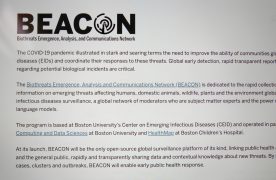Denouncing terrorism and war, a crowd of more than 100 people erupted in applause last night at “Voices of Hope,” an anti-violence discussion at Faneuil Hall.
The American Friends Service Committee and the Sept. 11 Families for Peaceful Tomorrows collaborated to bring together eight diverse speakers promoting anti-violence sentiment in front of an equally diverse audience comprised of Boston residents, students from around the world and families of Sept. 11 victims.
“Drop Bush, not Bombs,” read a sandwich board held by World War II veteran Paul Brailsford of Ipswich.
“We are the answer,” said Joseph Gerson, Director of Programs for AFSC since 1978, as he welcomed the crowd.
Kristina Olsen, a Peaceful Tomorrows member, sang in memory of her sister, Laurie, who died on American Airlines Flight 11. The audience was moved to their feet at the conclusion of her performance.
“I imagined singing that song to President Bush and letting him feel that energy,” Olsen said, “and hopefully changing his mind.”
United States citizens need to maintain open minds, said Peaceful Tomorrows co-director David Portori, whose 52-year-old brother James died in the World Trade Center last September.
“We no longer live on a planet called the United States of America,” Portori said. “The last remaining hope for security would be a just, civil society.”
An eyewitness to the effects of the war in Afghanistan, Ragina Hamidi, born in Kandahar, took the stage to share the similarities between the injustices she suffered as a child and those being committed in the Middle East today.
Hamidi described her “spiritual calling to be with people in great need,” which took her back to Afghanistan despite her fears related to Sept. 11.
Other international activists shared their diverse experiences related to and caused by the war on terrorism.
According to Filipino Amirah Ali Lidasan, her son and husband were among 100 citizens killed while 1,000 U.S. troops were stationed on Mindanao, her native island.
“We don’t want our country to be a military base,” she said.
Several Middle Eastern activists were present as well, asking the crowd to save the children and help to eliminate the conflict between Israel and Palestine.
Representing peaceful Palestinian and Israeli populations, Hilda Silverman read the words of long-time Israeli peace activist Nurit Peled-Elhanan, who suggested that the line drawn between Palestinians and Israelis should be replaced with the division of peace-lovers and war-lovers.
Sinan Antoon, an Iraqi-American poet who was in the region during the Gulf War spoke of the dangerous repercussions of sanctions he said hit innocent civilians the hardest.
“This is not a totalitarian government. Here we have the power to say ‘No,’ supposedly,” Antoon said, calling for public resistance to unjust policies, as cries of “No” emerged from the crowd.
This is an account occasionally used by the Daily Free Press editors to post archived posts from previous iterations of the site or otherwise for special circumstance publications. See authorship info on the byline at the top of the page.












